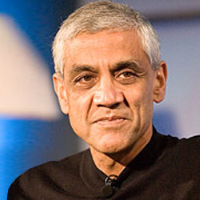Judge Tells Billionaire to Unblock Half Moon Bay Public Beach Access
 Vinod Khosla
Vinod Khosla
A year ago, Silicon Valley billionaire Vinod Khosla won a court ruling that he could close public access to the Half Moon Bay beach he bought because its origins of private ownership predated California statehood.
The 1848 Treaty of Hidalgo doesn’t get trotted out in court very often but it was effective in preventing people who had used Martins Beach for a century from regaining access. That didn’t end the issue, however, and Wednesday San Mateo County Superior Court Judge Barbara Mallach ordered the gate he installed be unlocked.
Khosla may have Hidalgo on his side, but the judge said he still needed to apply to the California Coastal Commission for a permit before making a change in the property’s development. That change doesn’t have to be physical, Judge Mallach said, encouraging public access advocates up and down the coast. It can simply be a change in access to the Pacific Ocean.
The Coastal Commission hasn’t exactly been supportive of Khosla’s efforts since he bought the property for $37.5 million in 2008 and closed the access gate two years later. The commission, along with a different Superior Court and county planners, told Khosla he needed a permit.
The panel sent Khosla a notice of violation in 2011, which he contested, and the two parties opened private negotiations. That didn’t work and two lawsuits were filed in an effort to gain access.
The first one addressed a broad issue of coastal access. Judge Gerald Buchwald ruled that the Hidalgo treaty, which settled the Mexican-American War, granted the 200-acre beach property to Jose Antonio Alviso before California’s Constitution in 1879 established the public trust doctrine that preserved access to such areas for all state residents.
People were free to approach the beach by sea, but land access was up to Khosla. That decision is being appealed.
In the past, access had been cheap and easy. Visitors paid a small parking fee to use the beach after the Deeney family bought the property in 1918 and began building and leasing the 45 cabins that sit on the cliffs, according to the San Francisco Chronicle. The Deeney family operated a country store, restrooms and other facilities for the public, while keeping open the only road that provides access to the beach.
Khosla’s attorneys argued that the fact Deeney could charge for access was an acknowledgement that the beach was private property.
The beach was popular with surfers and the lawsuit that succeeded Wednesday was brought by the non-profit Surfrider Foundation. Surfrider attorneys asked the judge to fine Khosla $20 million, but she said he acted in good faith when he refused to apply for a permit. Their website indicates they expect a long, protracted appeal that could last years.
While the court battles played out, state Senator Jerry Hill (D-San Mateo) introduced SB 968, an authorization to grab the property in question using the power of eminent domain. The bill was amended to simply lean on Khosla by offering to negotiate with him while the state’s threat loomed in the background.
The Legislature passed the bill in August and it was sitting on Governor Brown’s desk as of Wednesday waiting his signature or veto.
–Ken Broder
To Learn More:
Martins Beach: Judge Rules against Mogul Vinod Khosla, Orders Gate Opened to Public (by Aaron Kinney, San Mateo County Times)
Billionaire Must Let Public Access Martins Beach, Judge Rules (by Peter Fimrite, San Francisco Chronicle)
Judge Says Landowner Wrongly Denied Public Access to Martin's Beach (by Amanda Covarrubias, Los Angeles Times)
Silicon Valley Billionaire Vinod Khosla Loses Lawsuit in Beach Access Case (by Patrick Chu, San Francisco Business Times)
Judge Invokes 1848 Treaty to Block Public Access to Billionaire’s Beach (by Ken Broder, AllGov California)
- Top Stories
- Controversies
- Where is the Money Going?
- California and the Nation
- Appointments and Resignations
- Unusual News
- Latest News
- California Forbids U.S. Immigration Agents from Pretending to be Police
- California Lawmakers Urged to Strip “Self-Dealing” Tax Board of Its Duties
- Big Oil’s Grip on California
- Santa Cruz Police See Homeland Security Betrayal in Use of Gang Roundup as Cover for Immigration Raid
- Oil Companies Face Deadline to Stop Polluting California Groundwater





